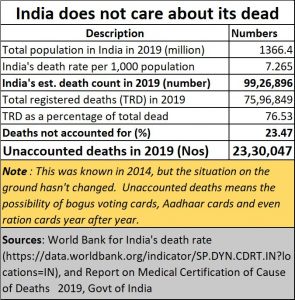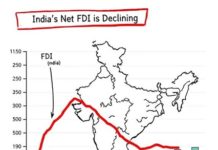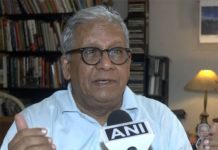https://www.freepressjournal.in/analysis/the-missing-dead-series-part-i-india-cares-little-for-the-dead-even-the-living
The entire series can be found at http://www.asiaconverge.com/2021/06/missing-dead-series/
The missing dead series – Part I
Those who don’t respect the dead, cannot respect the living either
By RN Bhaskar
When beggars die, there are no comets seen;
The heavens themselves blaze forth the death of princes.”
William Shakespeare, Julius Caesar
The brutal reality of Shakespeare’s words become more painful when one considers how India treats its dead. And as the old saying goes, you cannot expect a government to respect the living, if it hasn’t learnt how to respect the dead.
 This article is thus the first in a three-part series that examines this horror confronting the civilised world. The second part of the article is about how and why states fudge numbers. The masters at this game are (no prizes for guessing right) Bihar, Jharkhand, Utar Pradesh (UP), Uttarakhand and Madhya Pradesh (MP). And slums of course. The third part of this series deals with what can be done to remedy the situation. The role of the Election Commission (EC) is crucially important. Medical seats need to be increased. And the supervision of the Supreme Court is urgently required (http://www.asiaconverge.com/2021/03/the-judiciary-series/) for the safety of both democracy and the Indian Constitution.
This article is thus the first in a three-part series that examines this horror confronting the civilised world. The second part of the article is about how and why states fudge numbers. The masters at this game are (no prizes for guessing right) Bihar, Jharkhand, Utar Pradesh (UP), Uttarakhand and Madhya Pradesh (MP). And slums of course. The third part of this series deals with what can be done to remedy the situation. The role of the Election Commission (EC) is crucially important. Medical seats need to be increased. And the supervision of the Supreme Court is urgently required (http://www.asiaconverge.com/2021/03/the-judiciary-series/) for the safety of both democracy and the Indian Constitution.
Brutal facts
Some of this harshness hits home when one is confronted with the queues of corpses in front of crematoriums waiting for their turn. The savagery hits harder when one watches photographs of corpses floating down the river or lying uncovered in the sandbank.
The lame excuses given out by government spokesmen makes the barbarity of the situation extremely agonising.
Yet, when one carefully analyses the data the government itself has given out, the indifference to the death of commoners is not a new story, visible only as an aberration during a pandemic. It is deeply ingrained in politicians and bureaucrats. They don’t even try to register deaths. Letting the dead pass away forgotten is good for politics, and often good for financial gain as well.
Check out the table alongside. During 2019, even before the pandemic hit India, at least 23 lakh people in India died without their deaths being registered. This number is not given in the government’s reports, but is derived from the death rate figure given out by the World Bank (https://data.worldbank.org/indicator/SP.DYN.CDRT.IN?locations=IN), and then deducting the total number of registered deaths from it. Moreover, there is a scam in the registration of deaths as well. But that shall be covered in the next article.
The numbers relating to the missing dead is not something the government is unfamiliar with. Way back, on August 28, 2014, an officer named RK Gautam, Deputy Registrar General, Office of the Registrar General of India, Ministry of Home Affairs, Government of India, formally raised this issue (http://www.asiaconverge.com/2015/08/why-indias-data-on-deaths-is-so-misleading/). He wrote that “the data on cause-specific mortality generated under the scheme suffers on account of reliability, representativeness and comparability…”
He also recorded “the present coverage to medically certified deaths to the total registered deaths are 20.2% and only 14.3% against the total estimated deaths.” His figures are a bit understated because he too was possibly misled. The situation is worse. Year after year, over 20% of the estimated deaths have been routinely forgotten. These dead might have been murdered, hounded out to die in the wilderness, massacred during the pogroms successive governments have engineered to polarise societies to win elections. Or they could have been destitutes whom the government was glad to be rid of. When a death is not registered, nobody knows about it.
During 2019, over 23 lakh persons went missing.
Profiting from death
But their ration cards probably survived, as did their pension papers. There was nobody to tell the government that they had died. And it is quite possible that their Aadhaar cards are alive as well, adding to the huge number of bogus Aadhaar cards plaguing this country. No matter what the government may say, there is enough documentation on record to confirm that more Aadhaar cards were given out than even the populations in some states (http://www.asiaconverge.com/2020/02/aadhaar-cards-populations-many-ways-rig-numbers-financial-transactions/).
And the surprising thing is that the EC has maintained a studied silence on this. It did not question the existence of bogus Aadhaar cards, on the basis of which election cards are issued. It did not ask questions on the basic flaw in the Aadhaar cards – that they authenticated the holder but did not identify him or her. And it has not made suggestions on how this situation should be rectified.
Worse, it has not asked questions about the Aadhaar cards of the dead that are floating around even now. Ditto with election cards. In other words, it has permitted stuffing the ballot boxes with bogus votes, even before the election process has begun.
This is serious because 20 lakh people dying – year after year — without any records suggests that their Aadhaar cards are still active, because nobody has cancelled them. Multiply this for the past five years, and you get a crore of Aadhaar and election cards that ought to be extinguished. In spite of this the EC has been myopic enough to suggest that it might allow voters to vote from anywhere (https://timesofindia.indiatimes.com/india/trials-to-let-you-vote-from-any-centre-soon/articleshow/80439278.cms).. Can you imagine a crore bogus voter (in addition to holders of bogus Aadhaar cards) turning up to vote selectively in constituencies where the margin of victory is slim? This will lead to state sponsored butchering of democracy and even the Indian Constitution.
Surely, someone must ask the Supreme Court to order an investigation into the acts of commission and omission on the part of the EC. Why has it remained silent about the missing dead? And why has the finance ministry also turned a blind eye because entitlements in the names of the dead may still be taking place, thus draining the exchequer.
When lawmakers ignore the bending of rules, and constitutional authorities look the other way, there is big trouble ahead.










































COMMENTS